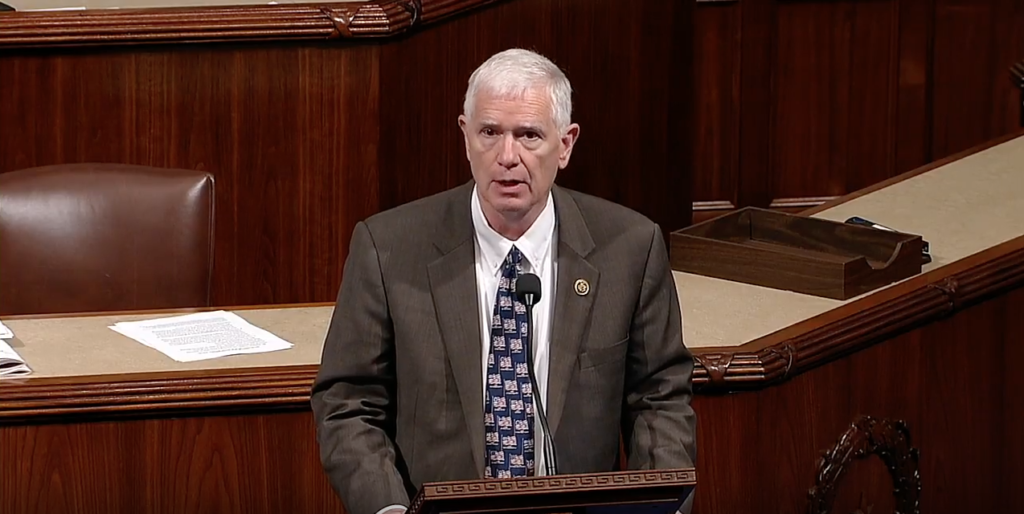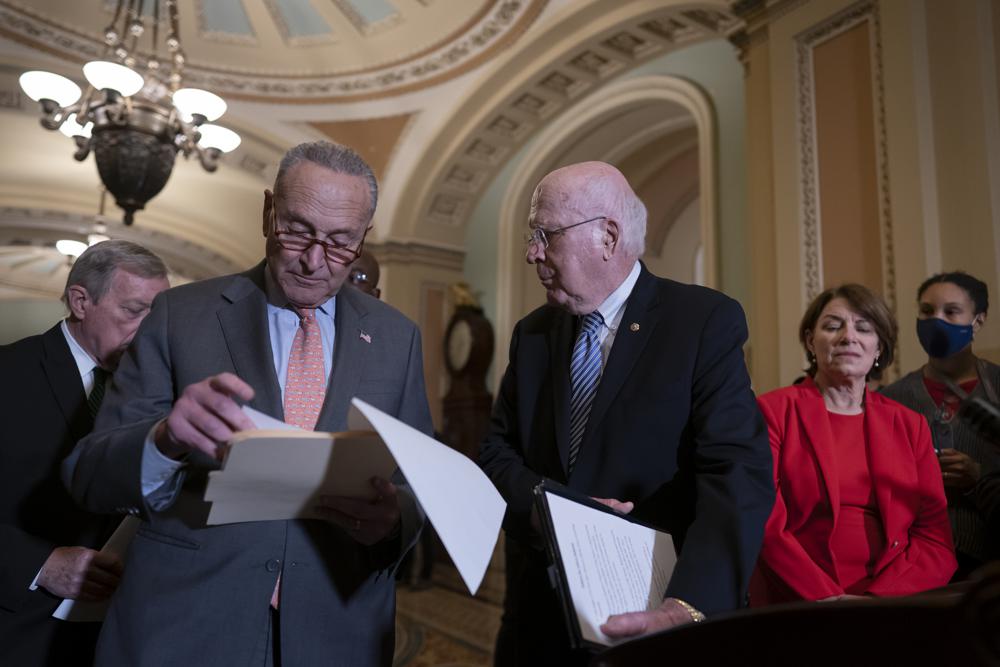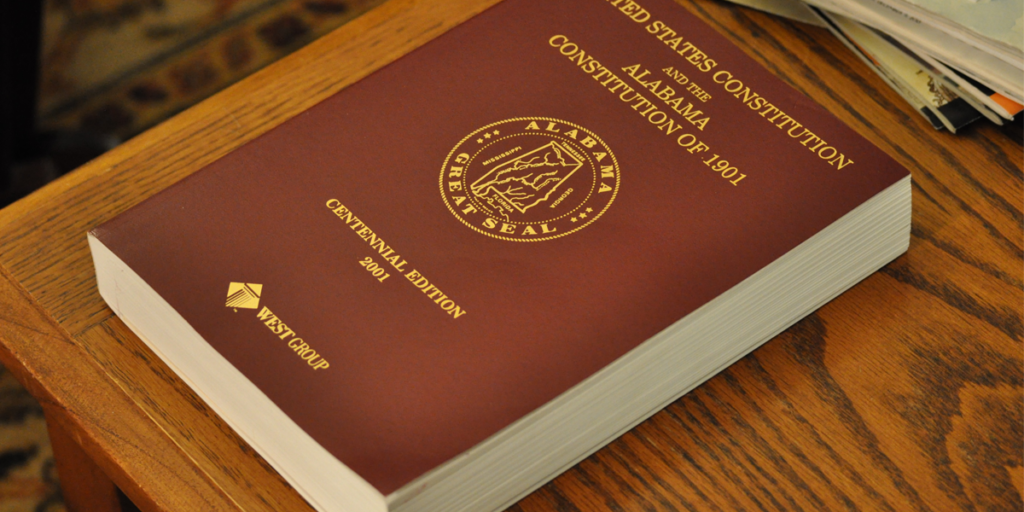Katie Britt urges lawmakers to protect workers against vaccine mandates

U.S. Senate candidate Katie Britt is urging Alabama Legislators to protect workers against the Biden administration’s vaccine mandates. It was announced today that Americans who work at companies with 100 or more employees will need to be fully vaccinated against COVID-19 by January 4 or get tested for the virus weekly. The Alabama Senate passed two anti-vaccine discrimination bills earlier this week, and the Alabama House of Representatives will see those bills on Thursday, Yellowhammer News reported. Senate Bill 9 and Senate Bill 15 are two of several bills the GOP-led legislature filed during the special session. Senate Bill 9 will provide workers the ability to claim exemption from the vaccine mandate. Senate Bill 15 will authorize the attorney general to pursue civil action against violators of the state’s ban on vaccine passports. The bill also requires parental consent for minors to get the COVID-19 vaccine. Chris Elliot, who authored Senate Bill 9, told the Alabama Daily News, “We’re trying to make this as easy as possible for the rank-and-file employees that don’t have a law degree or don’t want to go out and hire an attorney to be able to claim their exemption without an undue burden.” Britt, former chief executive of the Business Council of Alabama (BCA), is publicly disagreeing with her former employer. BCA is against Senate Bill 9, arguing that it puts employers in a “no-win position” by forcing them to comply with conflicting state and federal laws. Robin Stone, the BCA’s interim executive director, stated, “This legislation would prevent Alabama employers from making their own personnel decisions and place that authority in the hands of state government.” Britt stated, “Joe Biden’s tyrannical mandate threatens the livelihood of countless Alabamians and the freedom of every American. This vast overreach and coercion is not a solution to a problem; it only causes problems. Real leadership would find a way to simultaneously protect the lives of Americans while preserving their jobs and safeguarding their freedoms.” Senate Bills 9 and 15 now move to the full House for a vote.
Mo Brooks aims to ban federal funding for vaccine mandates

Congressman Mo Brooks has introduced the Defund Federal Vaccine Mandates Act in response to the Biden Administration’s recent vaccine mandates that will require Americans who work at companies with 100 or more employees to be fully vaccinated against COVID-19 by January 4 or get tested for the virus weekly. The short, one-sentence bill aims to “prohibit the use of Federal funds to establish, implement, or enforce any vaccine mandate.” Brooks commented, “Every single American should have the ability to make the best decision for them and their own health, without fear of losing their livelihood. The government should not try to intimidate, coerce, or force anyone into receiving the vaccine. Due to the rapid speed at which these vaccines were developed and distributed, and the growing list of side effects, hesitancy is understandable. Furthermore, it is none of the government’s business who has or has not been vaccinated. The Socialist Democrats’ pipe dream of discriminating based on vaccination status is wholly un-American. ” Congressman Brooks concluded, “The time for action is now, and the American people deserve to know who is willing to stand with them to defend our constitution, our freedoms, and the principles that have combined to make America the greatest nation in world history. Congress needs to be put on record on where they stand on this issue. I refuse to idly sit by as people lose their jobs and America becomes a scene straight out of 1984.” In September, Arizona congressman Andy Biggs, and 21 of his colleagues, introduced the Freedom from Mandates Act to block President Joe Biden’s vaccine mandates. It bars the federal government from requiring employers to mandate vaccines or to mandating testing of employees. This week Biggs introduced a bill called the Nullify the Occupational Safety and Health Administration (NOSHA) Act. The bill aims to abolish the Occupational Safety and Health Administration (OSHA) as a response to the vaccine mandate. Biggs commented, “Arizona, and every other state, has the constitutional right to establish and implement their own health and safety measures, and is more than capable of doing so. It’s time that we fight back against the bloated federal government and eliminate agencies that never should have been established in the first place. I will not let OSHA push Arizona around with their bureaucratic regulations and urge my colleagues to support my effort to eliminate this unconstitutional federal agency.”
U.S. mandates vaccines or tests for big companies by January 4

Tens of millions of Americans who work at companies with 100 or more employees will need to be fully vaccinated against COVID-19 by January 4 or get tested for the virus weekly under government rules issued Thursday. The new requirements, which were first previewed by President Joe Biden in September, will apply to about 84 million workers at medium and large businesses, although it is not clear how many of those employees are unvaccinated. The Occupational Safety and Health Administration regulations will force the companies to require that unvaccinated workers test negative for COVID-19 at least once a week and wear a mask while in the workplace. OSHA left open the possibility of expanding the requirement to smaller businesses. It asked for public comment on whether employers with fewer than 100 employees could handle vaccination or testing programs. Tougher rules will apply to another 17 million people who work in nursing homes, hospitals and other facilities that receive money from Medicare and Medicaid. Those workers will not have an option for testing — they will need to be vaccinated. Workers will be able to ask for exemptions on medical or religious grounds. OSHA said companies that fail to comply with the regulations could face penalties of nearly $14,000 per violation. It was unclear how OSHA planned to enforce the rules: Even counting allied regulators at the state level, the agency has only 1,850 inspectors to oversee 130 million workers at 8 million workplaces. A senior administration official said OSHA will target companies if it gets complaints. The release of the rules followed weeks of regulatory review and meetings with business groups, labor unions and others. The regulations form the cornerstone of Biden’s most aggressive effort yet to combat the spread of COVID-19, which has killed more than 740,000 people in the U.S. OSHA drafted the rules under emergency authority meant to protect workers from an imminent health hazard. The agency estimated that the vaccine mandate will save more than 6,500 worker lives and prevent more than 250,000 hospitalizations over the next six months. Senior administration officials said the rules preempt conflicting state laws or orders, including those that ban employers from requiring vaccinations, testing or the wearing of face masks. The administration will face an immediate challenge from Republican state officials who are eager to fight Biden in court and in Congress. Senate Republicans immediately launched a petition to force a vote to overturn the vaccine mandate, but with Democrats controlling the chamber, the effort is nearly certain to fail. More than two dozen Republicans serving as state attorneys general have indicated they plan to sue, arguing that only Congress can enact such sweeping requirements under emergency authority. Last week, 19 states sued to stop Biden’s narrower mandate that employees of federal contractors be vaccinated. That requirement was scheduled to take effect December 8, but the administration said Thursday it will be delayed until January 4 to match the requirements on other large employers and health care providers. The rules will require workers to receive either two doses of the Pfizer or Moderna vaccines or one dose of the Johnson & Johnson vaccine by January 4 or be tested weekly. Employees who test positive must be removed from the workplace. The requirements will not apply to people who work at home or outdoors. Companies won’t be required to provide or pay for the tests, but they must give paid time off for employees to get vaccines and sick leave to recover from side effects that prevent them from working. The requirements for masks and paid time off for shots will take effect December 5. The Centers for Medicare & Medicaid Services issued a separate rule requiring vaccination for workers in 76,000 health facilities and home health care providers that get funding from the government health programs. A senior administration official said that several large private health care organizations imposed their own mandates and achieved high vaccination rates — 96% or higher — without widespread resignations. The White House sees the new requirements as a potent tool to winnow down the ranks of the tens of millions of Americans who have thus far refused to get a shot. For weeks, Biden has encouraged businesses not to wait for the OSHA rule to take effect. He has touted businesses that have already announced their own vaccine mandates and urged other companies to follow their lead. Administration officials say those efforts are paying off, with about 70% of the nation’s adults now fully vaccinated. Walmart, the nation’s largest private employer, said in late July it was requiring all workers at its headquarters in Bentonville, Arkansas, as well as its managers who travel within the U.S., to be vaccinated against COVID-19 by Oct. 4. But the company had stopped short of requiring shots for its frontline workers. United Airlines required U.S. employees to get vaccinated or face termination. Only a very small number of its 67,000 workers refused to do so. In August, Tyson Foods told its 120,000 U.S. workers that they must be vaccinated by November 1. A week before that deadline, the company said 96% of its workforce was fully vaccinated. However, some companies have expressed fear that some vaccine-hesitant workers might quit, leaving their workforces even thinner in what is already a tight labor market. Several large business groups complained about the timing of the mandate. Retail groups worried that the requirement could disrupt their operations during the critical Christmas shopping period. Retailers and others also said it could worsen supply chain disruptions. The National Retail Federation suggested that the new rules are not needed because the rolling average number of new daily cases in the U.S. has fallen by more than half since September. “Nevertheless, the Biden administration has chosen to declare an ‘emergency’ and impose burdensome new requirements on retailers during the crucial holiday shopping season,” said David French, a senior vice president for the trade group. The number of new COVID-19 infections in the U.S. is still falling from a summer surge
Senate Dems push new voting bill, and again hit GOP wall

If at first you don’t succeed, make Republicans vote again. That’s the strategy Senate Majority Leader Chuck Schumer appears to be pursuing as the New York Democrat forced another test vote Wednesday on legislation to overhaul the nation’s election laws. For the fourth time since June, Republicans blocked it. Democrats entered the year with unified, albeit narrow, control of Washington, and a desire to counteract a wave of restrictive new voting laws in Republican-led states, many of which were inspired by Donald Trump’s false claims of a stolen 2020 election. But their initial optimism has given way to a grinding series of doomed votes that are meant to highlight Republican opposition but have done little to advance a cause that is a top priority for the party ahead of the 2022 midterm elections. The Senate voted against debating voting legislation Wednesday, with Republicans this time filibustering an update to the landmark Voting Rights Act, a pillar of civil rights legislation from the 1960s. GOP senators oppose the Democratic voting bills as a “power grab.” “This is a low, low point in the history of this body,” Schumer said after the failed vote, later adding, “The Senate is better than this.” The stalemate is forcing a reckoning among Senate Democrats about whether to make changes to the filibuster rule, which requires 60 votes for legislation to advance. That could allow them to muscle legislation through but would almost certainly come back to bite them if and when Republicans take back control of the chamber. Earlier Wednesday, Schumer met with a group of centrist Democrats, including Sens. Jon Tester of Montana, Angus King of Maine, and Tim Kaine of Virginia, for a “family discussion” about steps that could be taken to maneuver around Republicans. That’s according to a senior aide who requested anonymity to discuss private deliberations. But it’s also a move opposed by moderate Sens. Kyrsten Sinema of Arizona and Joe Manchin of West Virginia. Without their support, Democrats won’t have the votes needed to make a change. Time is ticking down. Redistricting of congressional districts (a once-in-a-decade process Democrats want to overhaul to make less partisan) is already underway. And the Senate poised to split town next week for a home-state work period. “Senate Democrats should stay in town and focus on the last act in this battle,” said Fred Wertheimer, who leads the good government group Democracy 21. The latest measure blocked by Republicans Wednesday is different from an earlier voting bill from Democrats that would have touched on every aspect of the electoral process. It has a narrower focus and would restore the Justice Department’s ability to police voting laws in states with a history of discrimination. The measure drew the support of one Republican, Alaska Sen. Lisa Murkowski after Democrats agreed to make changes that she sought. But all other Republicans opposed opening debate on the bill. “Every time that Washington Democrats make a few changes around the margins and come back for more bites at the same apple, we know exactly what they are trying to do,” said Senate Minority Leader Mitch McConnell, who slammed the vote as “political theatre” on a trumped-up a “go-nowhere bill.” Murkowski, too, said she still had underlying issues with the bill as written while criticizing Schumer’s decision to force repeated “show votes.” “Let’s give ourselves the space to work across the aisle,” she said Wednesday. “Our goal should be to avoid a partisan bill, not to take failing votes over and over.” The Democrats’ John Lewis Voting Rights Advancement Act, named for the late Georgia congressman who made the issue a defining one of his career, would restore voting rights protections that have been dismantled by the Supreme Court. Under the proposal, the Justice Department would again police new changes to voting laws in states that have racked up a series of “violations,” drawing them into a mandatory review process known as “preclearance.” The practice was first put in place under the Voting Rights Act of 1965. But it was struck down by a conservative majority on the Supreme Court in 2013, which ruled the formula for determining which states needed their laws reviewed was outdated and unfairly punitive. The court did, however, say that Congress could come up with a new formula. The bill does just that. A second ruling from the high court in July made it more difficult to challenge voting restrictions in court under another section of the law. The law’s “preclearance” provisions had been reauthorized by Congress with overwhelming bipartisan support five times since it was first passed decades ago. But after the Supreme Court’s 2013 ruling, Republican support for the measure cratered. Though the GOP has shown no indication that its opposition will waver, there are signs that some of the voting changes Democrats seek aren’t as electorally advantageous for the party as some hope. Republican Glenn Youngkin’s victory in Virginia’s Tuesday gubernatorial election offers the latest test case. Democrats took control of all parts of Virginia’s government in 2019 and steadily started liberalizing the state’s voting laws. They made mail voting accessible to all and required a 45-day window for early voting, among the longest in the country. This year they passed a voting rights act that made it easier to sue for blocking ballot access. But those changes didn’t hurt Youngkin, who comfortably beat Democrat Terry McAuliffe, a popular former governor seeking a valedictory term. That’s still unlikely to change Republicans’ calculus. “Are we all reading the tea leaves from Virginia? Yes, absolutely,” Murkowski said. “Will it be something colleagues look to? It’s just one example.” Democratic frustration is growing, meanwhile leading to increasingly vocal calls to change the filibuster. “We can’t even debate basic bills,” said Minnesota Sen. Amy Klobuchar, a Democrat. “The next step is to work on ideas to restore the Senate.” Republished with the permission of the Associated Press.
Steven Reed blames low bail for murder rates surpassing last year’s total and crime rate going up

Gun-related crime is rising in Montgomery, and leaders are asking the courts to help solve the problem. From Sunday to Tuesday this week, there have been five homicides in the city, and three of those murders took place on Sunday reported WSFA News. Montgomery Mayor Steven Reed spoke at Tuesday night’s City Council meeting. “We are still continuing to see far too many shootings in our city. Far too many of them are perpetrated by people who know one another.” On Sunday, law enforcement responded to four separate shootings that resulted in the death of four people. The city’s homicide total for this year is 69. Last year’s total was 68. “One life lost is certainly one too many,” Reed said. During his speech at the council meeting, Reed said the Montgomery Police Department is not to blame for the rise in crime, but he did blame the judicial system. Reed argued that criminals are being bailed out of jail and are ending up back on the streets. “We got to make sure we got the full participation and the full partnership of our Judicial Branch in this community, and that’s not happening right now. When the men and women of the Montgomery Police Department are re-arresting the same people over and over again, that’s a problem,” Reed commented. “When a bond for murder is set at $150,000, but someone arrested for drugs has a bond set at $200,000, that’s a problem to me,” Reed continued. Police Chief Romana Harris agreed with Reed and other city leaders. They all say they need help from the judicial system to make sure repeat offenders aren’t being released back into the community. “We would like to see them being released less,” Harris stated. “$150,000 I don’t think is a suitable amount, even with due process, because we’ve had situations where we’ve seen those that are out on bond for murder that are now committing new murders while they’re out on bond.” “We need the judges to make sure that they’re following through, and if you have people who are repeat offenders you cannot let them out with these low bails. You have got to send a message,” Reed said.
Huntsville schools ask state about renaming Lee High School

The public school system in Huntsville has agreed to ask Alabama’s attorney general whether it can rename a school honoring Gen. Robert E. Lee without violating a state law meant to protect Confederate memorials and monuments. News outlets reported that board members during a meeting Tuesday authorized their attorney to seek an opinion about whether such a move would conflict with the Alabama Memorial Preservation Act, which carries a $25,000 fine. Passed in 2017 when rebel monuments were being challenged nationwide, the law prohibits the removal, alteration, or renaming of any monument that’s located on public property which has been in place at least 40 years. Board attorney Chris Pape said Lee High School moved into a new building in 2012, the law shouldn’t apply. But one baseball field remains from the school’s original 1957 location, so the system is asking Attorney General Steve Marshall’s office if “that one piece is enough to make the act apply,” Pape said. Superintendent Christie Finley announced a proposal to rename the school in June. Huntsville is in Madison County, which paid the $25,000 penalty to the state after removing a Confederate monument from outside the courthouse last year. Republished with the permission of the Associated Press.
Alabama seeks to purge racist language from Constitution

The Alabama Constitution, written in 1901, still has language stating that schools should be segregated by race and people are to pay poll taxes to vote. The Committee on the Recompilation of the Constitution on Wednesday approved a plan to strip racist language from the state’s governing document. It also reorganizes the massive, sprawling document that has nearly 1,000 constitutional amendments to try to make it more user-friendly. The committee’s proposal will be considered by lawmakers in the 2022 legislative session. If approved, it would go before voters in November of 2022. “The moving racist language portion, I think is a great first step in righting some of the wrongs of the past of the state of Alabama,” said Democratic Rep. Merika Coleman, who chairs the committee and sponsored the legislation setting up the process. “We know the spirit in which the document was written, and it was written specifically to disenfranchise, not only black Alabamians but also poor Alabamians.” The framers of the 1901 constitution were clear that their goal was to maintain a government controlled by white people. “The new constitution eliminates the ignorant negro vote and places the control of our government where God Almighty intended it should be -– with the Anglo-Saxon race,” John Knox, president of the constitutional convention, said in a speech urging voters to ratify the document. The pending plan would strip language on segregated schools and poll taxes and that allowed a brutal convict lease system that sold African American men, often arrested under dubious circumstances, into forced labor. While those provisions have largely been invalidated by court rulings, the vestiges of Jim Crow remain in the state’s chief governing document, such as the fight to maintain segregated schools. In the wake of the 1954 Supreme Court decision that said racially segregated schools were unconstitutional, Alabama adopted Constitutional Amendment 111 allowing parents to opt for students to “attend schools provided for their own race.” Proponents in Alabama are hopeful that this effort will succeed where others have failed. Voters in the mostly white, conservative state had rejected similar proposals twice since 2000 after they became intertwined with school funding issues. The committee is hoping to sidestep that issue by not altering language stating there is no right to a public education. State voters in 2000 did vote to remove a ban on interracial marriages but about 40% of voters cast ballots to keep the interracial marriage ban in the Constitution. Coleman said she is optimistic the proposal will win approval as long as no one tries to falsely tie the effort to the national politics or “some of the stuff that is going on nationally with critical race theory.” Coleman said striking the Jim Crow language sends a message that the state has changed. “It’s so heartbreaking when you hear negative connotations when it comes to Alabama when someone is talking about something that is backwards or outdated and they refer to it as ‘Bama.’ I think this is helpful in trying to let — not only the rest of the country know, but the world knows — that that is not who we are.” Republished with the permission of the Associated Press.
Mike Rogers introduces bill for year-round Daylight Saving Time

Rep. Mike Rogers has introduced legislation that will allow states to stay on Daylight Saving Time year-round. In May, the Alabama legislature passed legislation, however, an Act of Congress must be passed to allow states to make this change. Rogers’ bill will allow any state to change to year-round Daylight Saving Time. According to the National Conference of State Legislatures, 15 states have enacted legislation or passed a resolution to provide for year-round daylight saving time, if Congress were to allow such a change. Rogers stated in a press release, “Every fall I hear from constituents who ask why we have to change the clocks and wonder what can be done to stop this nuisance. Earlier this year Alabama passed legislation to have year-round Daylight Saving Time but it takes an Act of Congress to allow them to actually make the change. This is why I introduced legislation that will allow Alabama to stay on Daylight Saving Time year-round.” Rogers argued that the practice is no longer needed. Rogers continued, “Changing the clocks twice a year is an antiquated practice, and studies have shown that year-round Daylight Saving Time has potentially huge benefits for the economy and people’s health. Who doesn’t love a little more sunshine in their day?” Alabama passed legislation to have year-round Daylight Saving Time but it takes an Act of Congress to allow them to actually make the change. Today, I introduced legislation that will allow states like Alabama to stay on Daylight Saving Time year-round.https://t.co/kNj7rFYlMn pic.twitter.com/hxxPB5i5i7 — Mike Rogers (@RepMikeRogersAL) November 2, 2021


